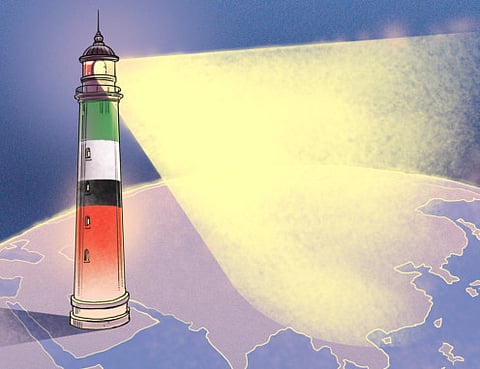UAE’s growing openness
Dubai and Abu Dhabi are becoming global hubs linking Africa, Asia and Europe

The UAE is achieving growing global and regional influence by focusing on being an active part of the global community and working towards the transparent values that allow individuals the security of the rule of law. This is in sharp contrast to some other Middle East countries that have got lost in predatory authoritarian governance and are now stuck in sectarian or military struggles, which have dragged them backwards into chaos and despair, rather than offering their populations hope that their ambitions can be fulfilled.
The UAE is a small country that cannot hope to be a regional power as traditionally defined through large populations and military authority. Instead, it is using its wealth to build the necessary infrastructure and social and business environment that will make the country one of the world’s major business hubs.
The work for this has been going on for a long time, but it is now becoming more globally recognised. For example, in August, Forbes magazine rated Dubai as the seventh most influential city in the world. It was also the only city from the developing world to make it to the top 20. The magazine attributed this to Dubai’s strategy of focusing on prosperity and globalisation. The list was topped by London, followed by New York, Paris and Singapore, which Forbes pointed out signalled a shift of power to “savvy” cities, as it added that the cities to watch are Houston, Seoul, Shanghai and Abu Dhabi. This high-tech environment is exactly where the cities of the UAE are heading, as illustrated by this week’s rollout of hundreds of free Wifi hot spots in Abu Dhabi and Dubai as a start towards making UAE cities fully connected at all times.
The question is what will the UAE do with its growing influence? For decades, it has made its own internal development its major priority, because in 1971, the country started with very rudimentary facilities and very limited education. Four decades of hard work has lifted the country into a totally different league and has allowed it to look ahead with a lot more confidence and vision.
This is why it is seeing what is happening in the region and offering some alternatives to the current chaos. The UAE has taken a strong position against religious extremism and is standing up for the values of open thinking and stability, which are designed to reject the nihilism of radical terrorists, and find a way to help end the civil wars and social collapse in Iraq, Syria and Libya.
Defeating Daesh (Islamic State of Iraq and the Levant) requires both military and political strategies, which is why His Highness Shaikh Mohammad Bin Rashid Al Maktoum, Vice-President and Prime Minister of the UAE and Ruler of Dubai, recently spelt out three long-term social and developmental points with which to combat extremism, based very much on the fundamentals of governance that have succeeded in taking the UAE this far.
Shaikh Mohammad’s first idea was to counter malignant ideas with enlightened thinking, open minds and an attitude of tolerance and acceptance. His second was to support the governments’ efforts to create stable institutions that can deliver real services to the people; and the third element was to address the black holes of human development, which include poverty, lack of education and poor health care, as well as lack of economic opportunities. These kind of priorities as put forward by Shaikh Mohammad combine the growing authority of the UAE as an important emerging global hub with the country’s own experience in fostering tolerance and the rule of law as the basis of building a new economy in which its people can succeed in achieving ambitions.
The UAE’s success in becoming a hub linking Asia, Africa and Europe has been noticed in several forums. While most of the attention has been on how the UAE is looking to its new partners in Asia and the Far East, a new paper by Afshin Molavi of Johns Hopkins University has looked at how Dubai is becoming a gateway to Africa for many multinationals as they use their operations in the city to build a new Africa strategy.
The 54 states of Africa have gone from a modest joint gross domestic product of $600 billion (Dh2.2 billion) in 2000, to close to $2.2 trillion today. This extraordinary growth has forced the world to take a new look at the emerging prosperity and power of African states. UAE companies like etisalat and DP World have led the way in direct investment, while UAE airlines like Emirates and Etihad are expanding their networks across the continent. In addition, Dubai’s successful bid to host the World Expo 2020 will also give the country greater respect as more people will visit it and realise how it is a key nexus of commerce, investment and tourism.
What emerges from all this will be a combination of more domestic prosperity for the UAE, as well as a much increased influence in the region and the world at large, using the key principles of tolerance and openness that are part of the UAE’s Arab and Islamic identity. This readiness to help define the matrix that will support a more secure world is as important as any short-term military activity.



